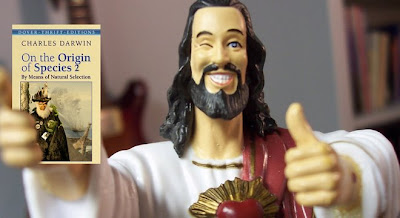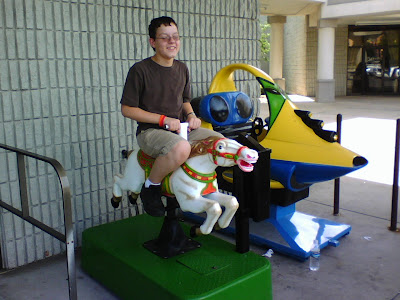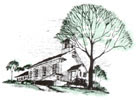
Today is the 200th birthday of Charles Darwin. I recently finished reading his travelogue,
The Voyage of the Beagle, which I enjoyed immensely. As a consequence of having the book listed in my "What I'm Reading Now" section on this blog, I received an email from Peter McGrath, the director of the
HMS Beagle Project. McGrath is working to build a replica of the HMS Beagle, which will "sail the world in Darwin's wake, and will inspire global audiences through unique public engagement and learning programmes, and original scientific research in evolutionary biology, biodiversity and climate change." It seems that, at least on Mr. McGrath's side of the pond, the legacy of Charles Darwin is alive and well in the minds of the general public. Here in the United States, though, the mention of Darwin's name still is cause for agitation among some circles.
I remember back in the 1980s, a family member who loved me very much and didn't want my interest in biology to pave the road to hell gave me two books that proved to be interesting reading. One was "
From Goo to You by way of the Zoo" and the other was "
The Natural Limits to Biological Change." These two books "explained" why the Charles Darwin's theory of evolution was not only wrong, but how it was dangerous because it led people astray from the "truth" of creation as expressed in the opening chapters of Genesis. (There are, of course, TWO Biblical creation stories in the book of Genesis and they differ significantly, but the authors managed to ignore that fact...)
Out of respect for the giver of these books, I read them but, even as a high school student, found myself shaking my head at the lack of scientific understanding reflected in them. First, they both took the word "theory" and insisted on using it in its colloquial sense, as in when Uncle Ned tells you that he has this theory that the reason gas prices go up and down is because Martians fly their space ships over the gas stations at night and change the numbers when nobody is looking. Of course, in scientific parlance, a theory isn't a bit of random conjecture but, rather, is a well-supported principle that explains observable fact, such as Newton's theory of gravity or Einstein's theory of relativity. In addition to misusing scientific terminology, both books abused the scientific process by beginning with the assertion that the Biblical account of creation was literally true and then arguing that position instead of testing their hypothesis.
In its efforts to appear scientifically sophisticated to non-scientific readers, "The Natural Limits..." even talked about genetic experiments that various people had done with the common fruit fly,
Drosophila melanogaster, none of which resulted in a new species coming into existence
. I had been using
D. melanogaster in laboratory experiments because it has a very short reproductive cycle (about 10 days between generations) and because it has several genetic mutations that occur with great regularity, so I was familiar with what the book said about developing populations with one particular genetic trait. What the book didn't discuss, (and in this case an omission is the same thing as a lie) is that none of the of experiments were even attempting to create a new species. The whole tone of the book reminded me of the "scientists" who were employed by tobacco companies to "prove" that smoking is not hazardous to anyone's health.
Now, twenty-some years later and with genetic sequencing as a part of the scientific arsenal, it seems that the
Creation Science lobby has realized that Darwin's theory of evolution has become so fully accepted by botanists, zoologists, geneticists, and every other member of the scientific community that they have had to come up with a new way to package their product:
Intelligent Design.
In recent years, fundamentalist evangelicals have asserted that I.D. should be taught in public school science classes and states like South Carolina, Alabama, Missouri, Florida, Michigan, Kansas and Texas have wrestled with the issue of whether or how to teach the essentially religious doctrine of I.D.. Last year, the state of Louisiana approved having science teachers use "supplemental materials" when teaching about "controversial" scientific issues including evolution and global warming.
Something has gone badly wrong with religion in the United States when we allow religious idealogues to influence the teaching of science. What kind of education will children get if they are taught that "Gee, that question is too hard for me to answer, so I guess God must have done it," is an acceptable answer to a scientific question?
As a pastor, I feel that it is crucial for Christians to understand our faith in light of our understanding of the rest of the world. John Wesley, the founder of Methodism, used a four-part rubric for understanding theology, which his followers dubbed "the
Wesleyan Quadrilateral" and likened to the four legs of a stool. The four legs are:
- Scripture - The basis of our faith comes from the revelation of the Bible.
- Tradition - The practices of the church guide our interpretation of scripture.
- Experience - Each person's individual and communal experience of God help them to find theological truth.
- Reason - Rational exploration of the world around us leads us to better understandings of our faith.
When we look at the quadrilateral, we realize that there is a need for each of these four means of revelation. It isn't hard to see how too much reliance on part of the stool can lead to a skewed theology, such as when the church, using scripture and tradition, but not experience or reason, banned Galileo from teaching that the sun was the center of our solar system.
Today, we celebrate the 200th birthday of Charles Darwin, a scientist who was also a man of faith. We celebrate his insights and his desire to understand the workings of the universe. We celebrate the new understandings that experience and reason offer to our lives of faith. Happy birthday, Mr. Darwin, we could use a few more like you in our world!



 Today is the 200th birthday of Charles Darwin. I recently finished reading his travelogue,
Today is the 200th birthday of Charles Darwin. I recently finished reading his travelogue, 

